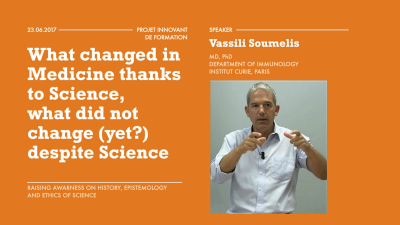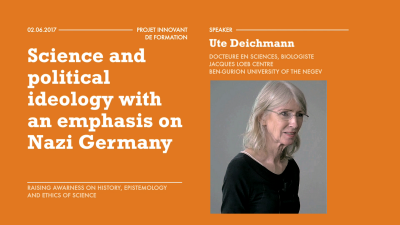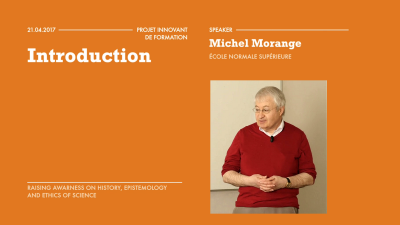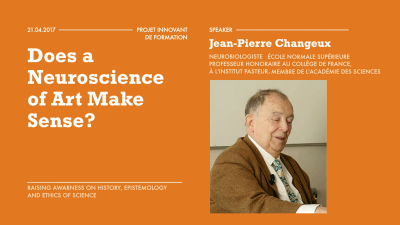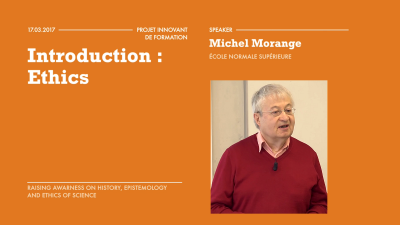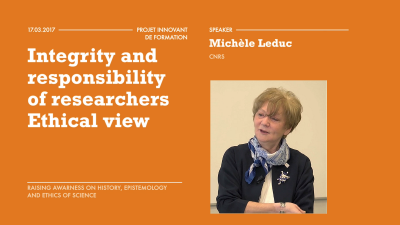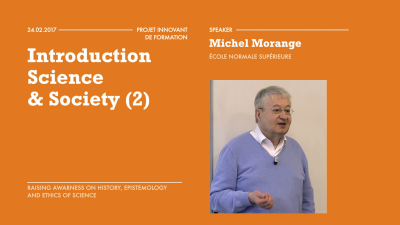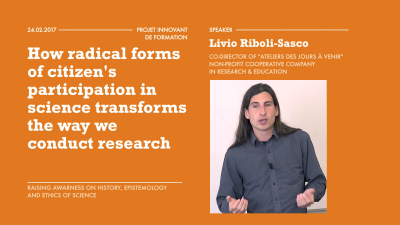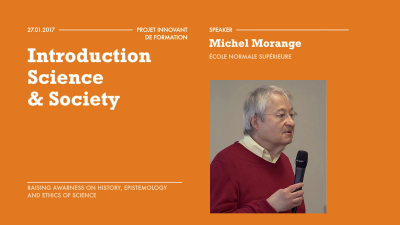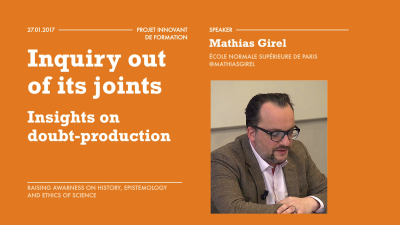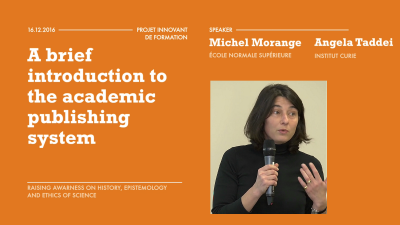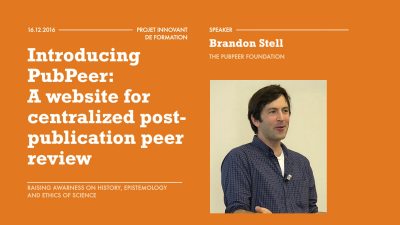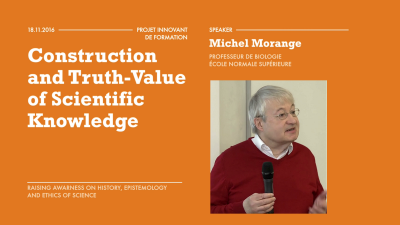Cette formation, portée par l’Institut Curie et l’Ecole Normale Supérieure (ENS) dans le cadre de l’appel d’offre « SPIF Doc » 2016, associant réflexion philosophique, études historiques et discussions sur les enjeux éthiques de la connaissance scientifique, est devenue indispensable à toutes celles et tous ceux qui travailleront demain en recherche ou, plus généralement, dans tous les métiers qui lui sont liés. Elle leur permettra non seulement d’améliorer leur démarche de chercheur mais aussi de développer une conscience citoyenne sur ces questions, et d’être mieux préparés au dialogue avec la Société.
Ce module, visant à mieux faire comprendre la nature des connaissances scientifiques, à apprécier leur place dans nos sociétés, et à discerner les enjeux éthiques liés tant au développement de ces connaissances qu’à leur application, s’est déroulé du 4 novembre 2016 au 23 juin 2017.
Ainsi, les intervenants ont donné leur accord à la diffusion de leur intervention dans le cadre des « formations en ligne ».
Les participants, quant à eux, n’apparaissent que de façon fortuite, anonyme, en groupe et en plans lointains. Les interactions éventuelles avec les intervenants ne sont diffusées que lorsqu’elles ont fait l’objet d’une autorisation préalable.
Ces dispositions sont rappelées et acceptées lors de l’inscription au module de formation.
Toutefois si, au cours d’un des ces programmes, vous observez une séquence qui vous semble contrevenir à ces dispositions, en vous exposant, par exemple, d’une façon qui vous semble trop personnalisée, nous vous remercions de nous le signaler, par messagerie électronique à l’adresse college-doctoral@univ-psl.fr, en précisant la localisation exacte de cette séquence afin d’en faciliter l’édition. Les corrections seront apportées dans les plus brefs délais, et vous seront notifiées.
What changed in Medicine thanks to Science, what did not change (yet?) despite Science
Epistémologie, Histoire des sciences, Sensibilisation à l’Histoire, l’Épistémologie et l’Éthique des sciences - 2017
23.06.20171:28:39
Does science help medicine to improve? Vassili Soumelis begins his lecture by surprisingly claiming that medicine is not a scientific activity but an empirical art. However, he says, science has helped medicine become more efficient throughout history, especially statistics, chemistry and biology. For each of these sciences, Soumelis exposes examples where medicine improved thanks to scientific knowledge. He concludes his presentation with the historical example of tobacco, first developed as a therapeutic substance and later considered as dangerous to one’s health.
Science and political ideology with an emphasis on Nazi Germany
Ethique, Histoire des sciences, Sensibilisation à l’Histoire, l’Épistémologie et l’Éthique des sciences - 2017
02.06.20171:28:15
What was the predominant scientific and political ideology in Nazi Germany? How was science conducted under Hitler? Are German scientists responsible for the Holocaust? In her lecture, Ute Deichmann answers these questions in detail. She begins her talk by recalling the definition of ideology and explaining it in the context of Nazi Germany. She then talks about the eviction of Jewish scientists under Hitler and the ideological transformation of science in universities and laboratories at the time. She tells the audience about the specific topic of race hygiene and euthanasia in Nazi Germany before finishing her talk by explaining the Nazi viewpoint on ecology and environmental medicine.
Introduction
Sensibilisation à l’Histoire, l’Épistémologie et l’Éthique des sciences - 2017
21.04.20175:01
In his introduction to Jean-Pierre Changeux’s lecture on the link between neuroscience and art, Michel Morange briefly introduces the neurobiologist.
Does a Neuroscience of Art Make Sense ?
Art et sciences, Sensibilisation à l’Histoire, l’Épistémologie et l’Éthique des sciences - 2017
21.04.20171:14:56
Does a neuroscience of art make sense? To answer this question, Jean-Pierre Changeux begins his lecture by giving a definition of art and aesthetics. He then explains how the human brain works from a neurologist’s point of view, and details its evolution throughout prehistory. Changeux’s goal is to demonstrate the link between art and cognitive conscience. To do so, he shows the audience how cultural experiences make the brain react. Genes, he says, are 100% responsible for neural development. And so are aesthetic experiences, he ads with humor. Changeux finishes his lecture by claiming that rules exist in art, and he even gives examples of these rules: novelty, surprise, and parsimony.
Introduction : Ethics
Sensibilisation à l’Histoire, l’Épistémologie et l’Éthique des sciences - 2017
17.03.201716:02
What is ethics? How should ethics influence the way we think and act? In his introduction to Michèle Leduc’s lecture, Michel Morange uses numerous examples of ethical issues throughout history, from Louis Pasteur to Olivier Voinnet. He recalls the different types of fraud and misconduct in science, and points out the emergence of rules to prevent them.
Integrity and responsibility of researchers Ethical view
Ethique, Sensibilisation à l’Histoire, l’Épistémologie et l’Éthique des sciences - 2017
17.03.20171:39:48
Who tracks fraud and misconduct? How do scientific communities prevent scientists from falsifying their research? In her lecture, Michèle Leduc starts by introducing COMETS, the French scientific ethical committee she works for. She then talks about the necessity of integrity in science, and lists several examples of misconduct that have been observed amongst scientists. Leduc mentions different ways to prevent such misbehaviors, naming ethical committees, self-examination and control websites. She talks at length about the case of Olivier Voinnet and the consequences of his actions. She concludes her lecture by calling for the responsibility of scientists in their research.
Introduction Science & Society (2)
Sensibilisation à l’Histoire, l’Épistémologie et l’Éthique des sciences - 2017
24.02.201713.59
Who are scientists? This is the question Michel Morange asks in his introduction to Livio Riboli-Sasco’s lecture. To develop his hypothesis, he first explains what anthropology of science is, and then defines “citizen science”. The problem, he concludes, is the difficulty to distinguish between professional scientists and amateurs.
How radical forms of citizen’s participation in science transforms the way we conduct research
Epistémologie, Sensibilisation à l’Histoire, l’Épistémologie et l’Éthique des sciences - 2017
24.02.201751:56
How are we producing knowledge? What changes when scientists work with citizens? In his lecture, Livio Riboli-Sasco explains how citizens’ participation in science transforms the way scientists conduct research. He uses many examples of research projects in which citizens are closely involved to show that citizens are legitimate in raising scientific questions. They bring objectivity to science, he says, and help scientists deepen their understanding of natural and human mechanisms. Riboli-Sasco ends his talk by enumerating obstacles he has faced when working on projects with citizens: the lack of funding, the institutional pressure on researchers, and the difficulty to find mediators.
Introduction Science & Society
Sensibilisation à l’Histoire, l’Épistémologie et l’Éthique des sciences - 2017
27.01.201723:28
Is science free? Does it have no limits? In his introduction to Mathias Girel’s lecture, Michel Morange talks about the role of scientists in their time. He then discusses the relationship between science and political power, as well as the dependence of science upon business. Morange ends his introduction by presenting Mathias Girel, professor of Philosophy at the École normale supérieure de Paris.
Inquiry out of its joints – Insights on doubt-production
Epistémologie, Ethique, Sensibilisation à l’Histoire, l’Épistémologie et l’Éthique des sciences - 2017
27.01.20171:08:54
How to face doubt-mongers? Can we use what we know of antic skepticism to defeat them? In his lecture “Insights on doubt-production”, Mathias Girel introduces his topic with 4 examples of eye-opening books. He then describes the different techniques doubt-mongers use to weaken scientific findings, and he discloses their strategy to make people believe their arguments. However, Girel explains, understanding of Greek skepticism can help defeat doubt-mongers by debunking their flimsy arguments. He then warns the audience about the risks of always doubting scientific findings and finishes his lecture by giving some tips to help science endure.
A brief introduction to the academic publishing system
Sensibilisation à l’Histoire, l’Épistémologie et l’Éthique des sciences - 2017
16.12.201613:24
What are the flaws of the traditional system of publishing research papers? Can we find an alternative way to this traditional system? In his introduction to Brandon Stell’s lecture on PubPeer, a website for centralized post-publication peer review, Michel Morange recalls the fundamentals of the traditional system of publishing research articles in scientific journals. He then gives the floor to Angela Taddei, who speaks of alternative systems of publishing for researchers, and discusses the example of BioRxiv, a preprint server for biology.
Introducing PubPeer : A website for centralized post-publication peer review
Ethique, Sensibilisation à l’Histoire, l’Épistémologie et l’Éthique des sciences - 2017
16.12.201636:33
Can we reduce the flaws in research thanks to a new kind of assessments on papers by the scientific community? In his lecture, Brandon Stell presents PubPeer, the website for centralized post-publication peer review he created in 2012. Inspired by journal club conversations, PubPeer enables scientists to discuss any publication in any field. This platform, Stell says, consequently reduces flaws in research by allowing open discussions and cross-examinations of the material. He then explains how the platform works: how to create an account, how to post comments about an article and how to answer them. He concludes his lecture by announcing the future developments for the platform in order to improve its efficiency.
Construction and Truth-Value of Scientific Knowledge
Sensibilisation à l’Histoire, l’Épistémologie et l’Éthique des sciences - 2017
18.11.20161:56:06
What is common knowledge? How different is it from scientific knowledge? In the first part of his lecture, Michel Morange questions the notion of knowledge and distinguishes it from belief. He also points out a philosophical ideology about the relative value of knowledge and discusses its ability to help scientists reach reality. He then explains in which ways scientific knowledge is different from common knowledge and uses the examples of the Greek philosophers, Louis Pasteur and Karl Popper to support his claim. Scientific knowledge, he says, is a search for natural explanations; it results from a long historical process. Morange ends his lecture by asking a question to the audience: is intelligent design a scientific theory?
 UNIVERSITÉ PSL
UNIVERSITÉ PSL



